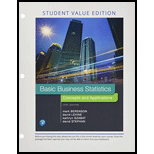
Business actively recruit business student with well-developed higher-order cognitive skills (HOCS) such as problem identification, analytical reasoning, and content integration skills. Researchers conducted a study to see if improvement in students ‘HOCS was related to the students’ GPA.
The researchers conducted a study in which business students were taught using the case study method. Using study method. Using data collected from 300 business students, the following
Where the dependent variables HOCS measured the improvement in higher-order cognitive skills, with 1 being the lowest Improvement in HOCS and 5 being the highest improvement in HOCS.
a. Construct a table of predicted HOCS, using GPA equal to 2.0,2.1,2.2, …,4.0.
b. Plot the values in the table constructed in (a), with GPA on the horizontal axis and predicted HOCS on the vertical axis.
c. Discuss the curvilinear relationship between students’ GPA and their predicted improvement in HOCS.
d. The researchers reported that the model had an
Want to see the full answer?
Check out a sample textbook solution
Chapter 15 Solutions
Basic Business Statistics, Student Value Edition
- 19. Let X be a non-negative random variable. Show that lim nE (IX >n)) = 0. E lim (x)-0. = >arrow_forward(c) Utilize Fubini's Theorem to demonstrate that E(X)= = (1- F(x))dx.arrow_forward(c) Describe the positive and negative parts of a random variable. How is the integral defined for a general random variable using these components?arrow_forward
- 26. (a) Provide an example where X, X but E(X,) does not converge to E(X).arrow_forward(b) Demonstrate that if X and Y are independent, then it follows that E(XY) E(X)E(Y);arrow_forward(d) Under what conditions do we say that a random variable X is integrable, specifically when (i) X is a non-negative random variable and (ii) when X is a general random variable?arrow_forward
 Glencoe Algebra 1, Student Edition, 9780079039897...AlgebraISBN:9780079039897Author:CarterPublisher:McGraw Hill
Glencoe Algebra 1, Student Edition, 9780079039897...AlgebraISBN:9780079039897Author:CarterPublisher:McGraw Hill Big Ideas Math A Bridge To Success Algebra 1: Stu...AlgebraISBN:9781680331141Author:HOUGHTON MIFFLIN HARCOURTPublisher:Houghton Mifflin Harcourt
Big Ideas Math A Bridge To Success Algebra 1: Stu...AlgebraISBN:9781680331141Author:HOUGHTON MIFFLIN HARCOURTPublisher:Houghton Mifflin Harcourt

